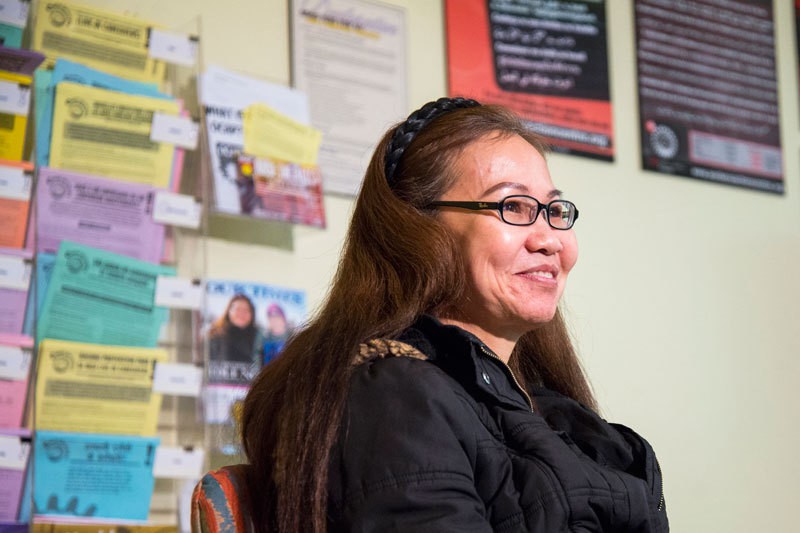Far From Home, Canada's Guest Workers Can Feel Isolated, Disrespected

By Óscar A. Contreras
Cronkite Borderlands Initiative
TORONTO -- Seven years after Rojana Jamjai came to Canada from Thailand as a guest worker, she finds herself entrenched in a metropolis knowing little English, without her family and friends, and with no job.
She went from being forever temporary in Canada to becoming forever stationary, lured by the possibility of making more money than she would have ever dreamed of in her homeland.
Jamjai came to Canada as part of the Stream for Lower-Skilled Occupations, a temporary guest worker program that draws migrant workers from countries such as Mexico, Guatemala, the Philippines, El Salvador and Thailand.
Canada has four different programs for lower-skilled guest workers: a Seasonal Agricultural Workers Program, a Temporary Foreign Workers agricultural stream, a stream for Lower-Skill Occupations (which is the program that Jamjai was recruited into) and the Live-In Care Program that allow foreign workers to have a work contract for a specific period of time, return to their home countries and keep coming back to Canada for work for an indefinite number of years.
Under the SWAP program, for example, workers must be from either Mexico or certain Caribbean countries (Jamaica, Grenada, Barbados, Trinidad and Tobago, among others), while under the Temporary Foreign Workers agricultural stream, workers can be from any country. In the Stream for Lower-skilled Occupations program, the workers have a high school diploma or a maximum of two-years training for the specific job which they’ll be doing. None of these options offer a path to permanent residency or citizenship.
The Live-in Caregivers Program, however, allows workers to apply for permanent residency after 24 months within four years of arriving in Canada.
But not every worker who comes into Canada is hoping for permanent residency. Many are solely interested in earning money to send home.
“I think that workers want everybody to know how important remittances are,” said Donald Wells, professor of Labor Studies at McMaster University in Hamilton, Ontario. “They come to Canada because it’s a matter of family survival.”
A remittance, or money sent by mail or electronic transfer, is the reason why temporary workers from many different parts of the world come to Canada. It’s also the reason why many third-world countries are able to sustain themselves economically.
According to research done by René Houle and Grant Schellenberg, who both work for Statistics Canada, Canada’s national statistical agency, Mexico topped the list of “remittance-receiving countries” with an estimate of about $18.1 billion sent back every year. That’s “more than the country’s total tourism revenues, more than two-thirds the value of petroleum exports, and about 180 percent of the country’s agricultural exports,” according to a 2006 report from the World Bank.
Wells says that the money the workers send through remittances is important for foreign workers but it’s not as important as giving the next generation chances for better life through education. “It’s a dream for them, to be able to educate their kids.”
Jamjai came to work in the mushroom fields for that exact reason.

Rojana Jamjai talks about her experience working as a guest worker in Canada. Jamjai says that relatively higher pay compels her to stay in Canada even though it means being away from her family in Thailand. Photo by Lillian Reid. |
Standing a little more than five feet tall with long, straight brown hair kept in place by a thin black headband, she smiles faintly. “I have to take care of my daughters… that’s why I decided to come here.”
Originally from Isan, the northeastern region of Thailand, Jamjai says that she needed to support her two daughters financially while they attended university but her part-time job at an office just wasn’t enough.
Then one day she heard that the government was recruiting people to go and work abroad. “That’s why I tried to go to apply, because we need the money for support my daughters,” she said.
She didn’t think twice when she found out that she would be harvesting mushrooms at a farm in the province of Ontario.
“For me, I’m OK (to) stay home but I think I want my daughters (to have a) better life because for me I would just like a little bit more money,” she said in tentative English.
And so in 2006 she flew more than 7,000 miles across the world, sacrificing family life to harvest mushrooms in a country where she couldn’t speak the language and had no family or friends.
Jamjai was recruited into the Stream for Lower-Skill Occupations, a program created in 2002 that requires employers to prove there is a labor shortage before they can recruit abroad.
Jamjai said she worked hard, rarely engaged in conversation with other workers with the singular goal of sending money home to her daughters.
“If they didn’t have mushroom…then, ‘OK, take a day off,’ but [we would work] almost seven days a week,” Jamjai said.
But her life changed suddenly when she was fired from the job for “not following instructions.” Jamjai said she was told to stay in the bunk house and do some cleaning instead of working in the mushroom field where she could earn money. She said she had a short argument with her employer and she was eventually ordered to pack her things and leave the country the next day.
“They don’t want me to stay here, but I have plans for myself,” Jamjai said. “I want a good life here.”
She immediately contacted her country’s labor liaison, who mediates issues on behalf of contracted workers, and the agency advised her to stay in Canada on the condition that she would refrain from doing farm work. She agreed. At 2 a.m. the next day, Jamjai packed her belongings and left the bunk house, never to return again.
Jamjai’s case illustrates the tenuous nature of a guest worker’s employment. One day she was picking mushrooms and, if the farmer had his way, the next day she could have been on a plane back to Thailand.
Wells, the McMaster University professor, said it’s that tenuous relationship that often keeps Canadian citizens from relating to foreign workers. He said workers are not seen as what they truly are -- fathers, husbands, wives and mothers.
“When people are just seen as workers, it’s a very narrow market relationship,” Wells said.
Wells thinks this disassociation causes the migrant workers to feel more isolated and as if they don’t belong.
“The number one issue is just for people to know about the people that are coming to Canada,” he said.
Language barriers are another obvious problem, Wells said.
That’s why Jamjai said she is studying English so she can eventually become a care-taker for children. But it’s her own children she misses the most. For now, she must remain in Canada if she hopes to find permanent work and legal residency.
“I call them [on Skype] and… mostly every time, they tell me to come back,” Jamjai said. “I tell my daughters, I (will) come back in the future, because I have plans for residence.”
Family separation is among the most difficult issues for guest workers to deal with, particularly in countries where there are language barriers and isolation from the community. In rural Ontario, a number of churches try to help fill the void.
“How do you integrate into a local community?” asked Marie Carter, a specialist for the Migrant Worker Ministry of London, Ontario. “You usually end up talking to the local population about things like your kids." But she said that is difficult for migrants who may not have spoken to their children in a long time and who have trouble communicating across language barriers.
The Migrant Worker Ministry of London provides for the spiritual, social and practical needs of migrant workers. The church conducts services in Spanish, organizes social events and provides health and safety training. It serves more than 5,000 Catholic Hispanic workers and partners with other groups to reach into other immigrant communities.
“Workers have a need to bridge to the community,” Carter said.
Back to Top
